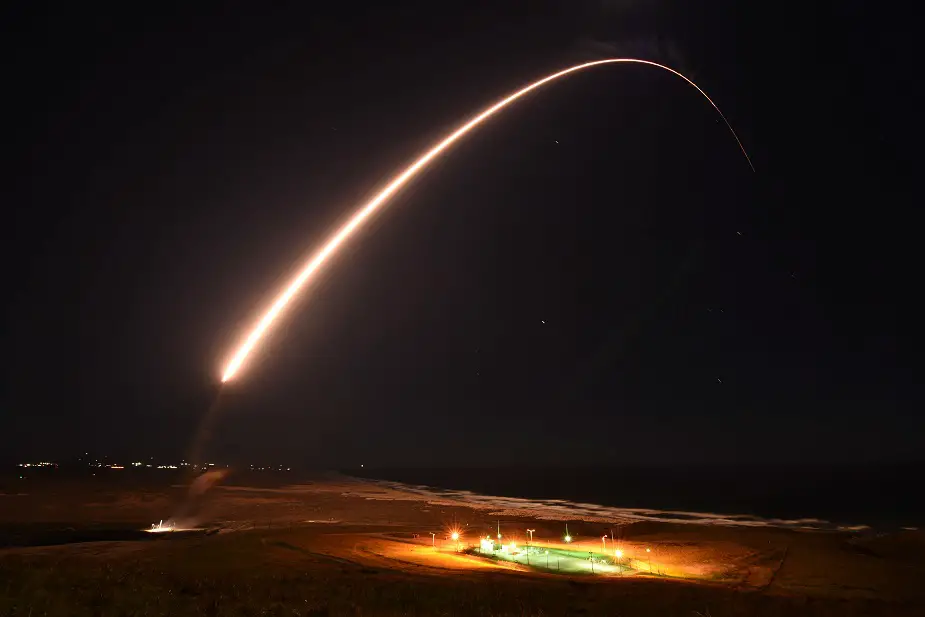Breaking news
Test launch of US Air Force Global Strike Command unarmed Minuteman III intercontinental ballistic missile.
A team of Air Force Global Strike Command Airmen launched an unarmed Minuteman III intercontinental ballistic missile equipped with a test reentry vehicle at 11:47 p.m. Pacific Time Feb. 24 from Vandenberg Air Force Base, California.
Follow Air Recognition on Google News at this link
 An Air Force Global Strike Command unarmed Minuteman III intercontinental ballistic missile launches during an operation test at 11:49 p.m. PT Feb. 23, 2021, at Vandenberg Air Force Base, Calif. ICBM test launches demonstrate the U.S. nuclear enterprise is safe, secure, effective and ready to defend the United States and its allies. ICBMs provide the U.S. and its allies the necessary deterrent capability to maintain freedom to operate and navigate globally in accordance with international laws and norms (Picture source: US Space Force)
An Air Force Global Strike Command unarmed Minuteman III intercontinental ballistic missile launches during an operation test at 11:49 p.m. PT Feb. 23, 2021, at Vandenberg Air Force Base, Calif. ICBM test launches demonstrate the U.S. nuclear enterprise is safe, secure, effective and ready to defend the United States and its allies. ICBMs provide the U.S. and its allies the necessary deterrent capability to maintain freedom to operate and navigate globally in accordance with international laws and norms (Picture source: US Space Force)
The test demonstrates that the United States’ nuclear deterrent is safe, secure, reliable and effective to deter twenty-first century threats and reassure our allies.
“Our nation’s ICBM fleet stands ready 24/7,” said Lt. Gen. Anthony Cotton, deputy commander of Air Force Global Strike Command. “Operational tests validate our Minuteman III readiness and reliability. It further demonstrates to our citizens, our allies and our partners that men and women across three missile wings provide credible overwatch with a strategic deterrent that is safe, secure and effective.”
During this test, the ICBM's reentry vehicle traveled approximately 4,200 miles to the Kwajalein Atoll in the Marshall Islands. These test launches verify the accuracy and reliability of the ICBM weapon system, providing valuable data to ensure a continued safe, secure and effective nuclear deterrent.
“Over the last year, our highly professional and dedicated team of Airmen, civilians and contractors have showcased phenomenal initiative and adaptability while continuing to run a successful ICBM test launch program despite the challenges of a world-wide pandemic,” said Col. Omar Colbert, 576th Flight Test Squadron commander. “Today’s launch sends a visible message of deterrence to the world, and I couldn’t be more proud of our team, which includes task force members from the three ICBM wings along with key expertise and support from Headquarters Air Force Global Strike Command, Headquarters Twentieth Air Force and the Air Force Nuclear Weapons Center.”
The test launch is a culmination of months of preparation that involved multiple government partners and demonstrates that even during the pandemic, AFGSC maintains various levels of redundant capability to assure a national deterrent. The missile came from the 341st Missile Wing, with men and women supporting the launch from all three AFGSC missile wings as well as the 576th Flight Test Squadron.
“The Task Force traveled from all three operational missile wings and executed a successful test launch. The maintenance members showcased the resourcefulness and technical expertise that make them the backbone of the ICBM mission,” said Maj. Jesse Haskett, Task Force commander. “The operators delivered an on-time on-target sortie and provided yet another reminder of the readiness and reliability of the Minuteman III weapon system. We’re all truly honored to conduct this mission in conjunction with the 576th Flight Test Squadron and proud to represent the numerous men and women that support the nuclear deterrence mission.”
The ICBM community, including the Department of Defense, the Department of Energy, and U.S. Strategic Command, uses data collected from test launches for continuing force development evaluation. The ICBM test launch program demonstrates the operational capability of the Minuteman III and ensures the United States’ ability to maintain a strong, credible nuclear deterrent as a key element of U.S. national security and the security of U.S. allies and partners.
The launch calendars are built three to five years in advance, and planning for each individual launch begins six months to a year prior to launch. Test launches are not a response or reaction to world events or regional tensions.



















